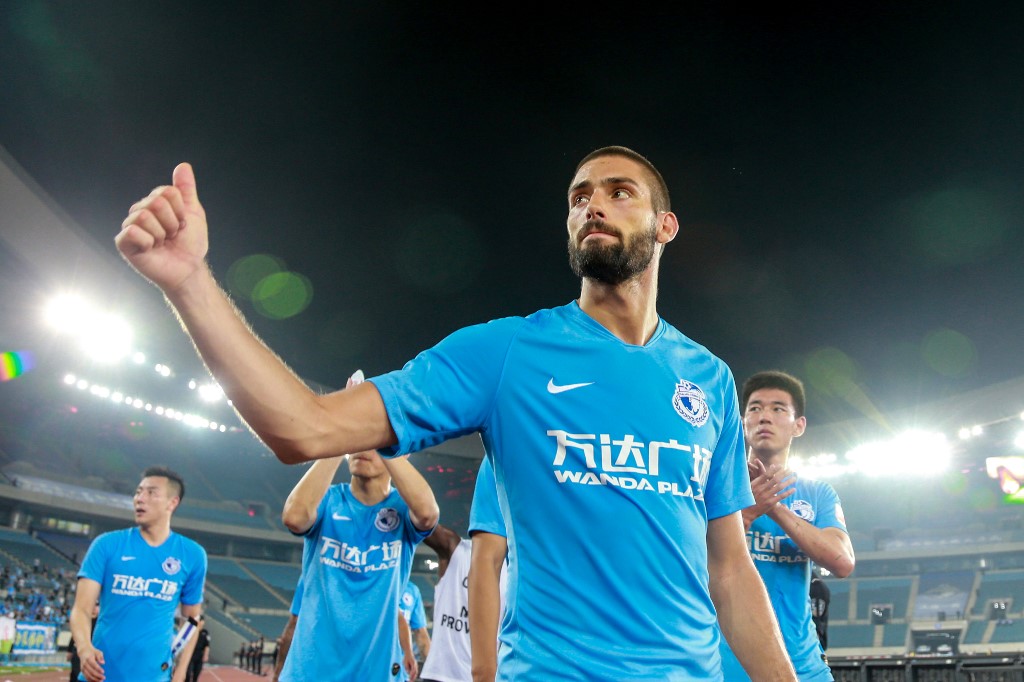
FILE – Dalian Yifang’s Yannick Carrasco (C) reacts after the Chinese Super League (CSL) football match between Dalian Yifang and Henan Jianye in Dalian in northeast China’s Liaoning province on July 7, 2019. (Photo by STR / AFP) / China OUT
A double blow of the coronavirus and a new salary cap has seen the bottom fall out of Chinese football’s transfer market, while Odion Ighalo led what could become an exodus of foreign stars.
Shanghai SIPG smashed the Asian transfer record when they signed Oscar from Chelsea three years ago for €60 million, with Hulk, Marouane Fellaini, Javier Mascherano and Carlos Tevez all moving to China in recent years.
Their arrivals put Chinese football on the map and provoked consternation in Europe’s major leagues that Chinese clubs were distorting the transfer market with world-leading wages.
But with wages now capped at €3 million a year, and the Chinese Super League on hold over the coronavirus outbreak, China isn’t the destination it once was.
China’s winter transfer window looks poised to close with a whimper on Friday, with Chinese Super League clubs spending just €28 million so far, the lowest since 2011.
There were two notable departures with striker Ighalo joining Manchester United on loan from Shanghai Shenhua and Belgian winger Yannick Carrasco returning to Atletico Madrid from Dalian.
China’s domestic football is indefinitely suspended because of the virus outbreak, which has killed nearly 2,800 people in the country and has now spread around the world.
Harry Belford Spencer, co-founder of First Pick Group, a Shanghai-based sports advisory company, said the uncertainty caused by the coronavirus had put off prospective foreign signings and dissuaded Chinese clubs from doing business.
“You are not going to invest a lot of money as a club if you don’t really know what’s happening,” said the Briton, who is involved in the Chinese transfer scene.
“You are signing these players with the intention of them playing earlier (from the start of the season in February), and there’s now this delay.
“You don’t want to build up a big wage bill and that’s probably why you see a guy like Ighalo joining United because why would Shanghai Shenhua want him on their books paying a salary when they’re not playing football?”
Cooling measures
Even before now, China’s transfer market had begun to cool after the Chinese Football Association brought in measures to encourage clubs to develop youth players.
The most significant was a 100 percent tax on foreign signings of more than 45 million yuan (€6 million), introduced in 2017.
In December, the CFA said that foreign players could not earn more than €3 million a year after tax.
That torpedoed any chance of Gareth Bale, who was on the verge of joining Jiangsu Suning from Real Madrid last summer, coming to China.
The salary cap will not affect existing contracts — SIPG’s attacking midfielder Oscar is one of the best-paid players in the world on a reported €26 million a year.
But it will hit foreign players when it comes to renewing, meaning they are likely to look outside China when their current deals expire.
‘Difficult for clubs’
In a sign of how Chinese clubs’ spending has plummeted this winter, the most expensive transfer over the last two months was Brazilian Ricardo Lopes, who went to SIPG from Jeonbuk Motors for €5.46 million.
The outlay this winter is the lowest since the 2011 window, with CSL clubs relying on free transfers, loans or signings for nominal fees.
Nine of the 16 sides in the league have not spent a penny, including Fabio Cannavaro’s champions Guangzhou Evergrande, according to transfermarkt.com figures.
While foreign players are hesitant to come to China because of the virus, domestic transfers have also slowed considerably because of the impact on everyday life and difficulties clubs face trying to plan for a season that has no start date.
Spencer, who expects the transfer market to pick up somewhat once the health crisis eases, said: “The virus of course makes it difficult for clubs to take players in.
“Whilst lots of China isn’t affected, it’s a reality of: do you want to play in China at the moment?”